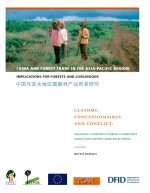Customs, Concessionaires and Conflict
Tracking Cambodia's Forestry Commodity Chains and Export Links to China
By Keith Barney - YCAR, Forest Trends, CIFOR, DIFID, Asia Pro Eco Programme View PublicationCambodia has obviously experienced some difficulty in implementing an effective framework of sustainable forest management. Indeed, the Cambodian forest sector can be considered a paradigmatic example of the close links between vast resource wealth on the one hand, and structural conflict and rural violence on the other. From the early to the mid-1990s, Cambodia’s illegal logging sector was a primary source of military financing for both the remaining Khmer Rouge forces in western Cambodia and political actors jockeying for power in Phnom Penh. Rather than ushering in a new era of improved forest governance, the final collapse of the Khmer Rouge instead resulted in a widening and intensification of “anarchic logging” by an elite network of concession holders with close ties to the upper levels of the Cambodian state. Le Billon characterizes the Cambodian forestry experience as the “instrumentalization of disorder”, in which the profits available from the forests came to represent a decisive means for actors to seize and hold political power within a context of conflict and state transition.

